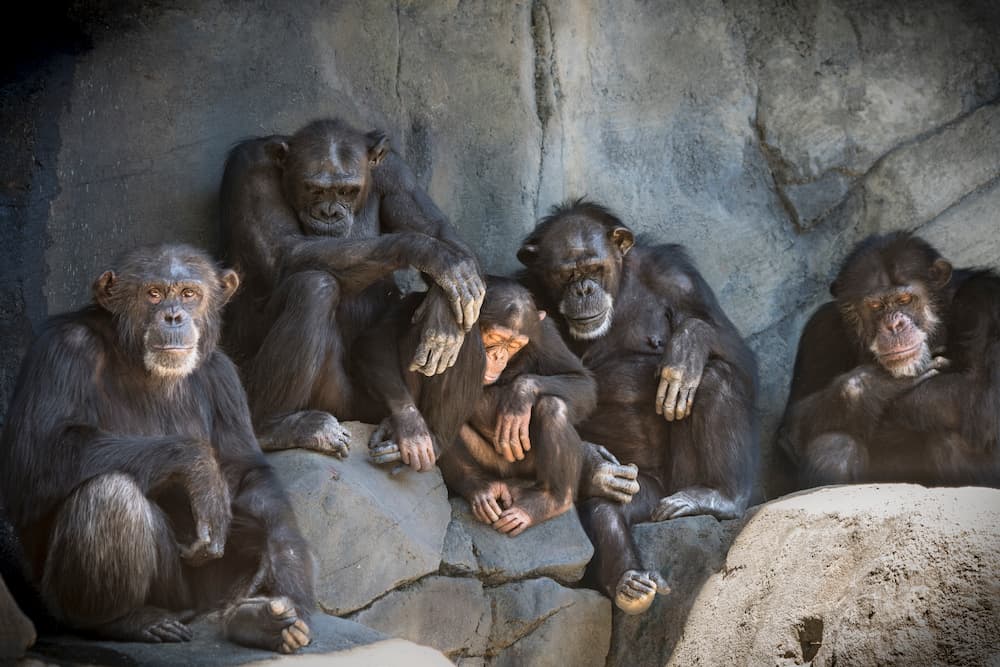by Autumn Hilden

The Zoo has recently welcomed two new chimpanzees! Curator of Mammals Candace Sclimenti says “the intros are going great” with the rest of the troop, and in fact the duo—two males—were recently made acquainted with the current alpha male. The newcomers are about halfway through the integration process, but you can catch a glimpse of their progress in the penthouse habitat, which can be viewed from the perimeter road or the Safari Shuttle.
The arrival of new animals always involves a lot of communication and preparation, and adding new members to the Zoo’s chimpanzee troop, one of the largest in the U.S., is no exception.
Sclimenti explains why the L.A. Zoo’s troop is special. “Our chimpanzees are similar to chimps in wild populations, because we’re fortunate to have the space to manage them in a fission-fusion fashion, where they can break down into sub-groups and have a choice of who they want to be with during the day [then come back together at night]. We can have a large, multi-male, mixed-age troop. These are all behaviors that wild populations exhibit.”
So, it’s important to introduce new animals that speak that “same language” of wild behavior. When working to bring these new chimps to the Zoo, special consideration was also given to balancing the troop’s female population, which has outweighed its male in recent years. Enter the two new males, Pu’iwa and Mshindi. “Male relationships are really important to chimpanzee society and to the cohesion of the group. We had only two adult males in our group of 14. The other two males are young, so we needed more males,” Sclimenti explains. “We’re hoping these two will bond well with our resident four males and give support to them. Our goal is to disperse some of the female power dynamics and have enough males to support one another in the troop.”
Who are the newcomers? Sclimenti and her team already have a good idea. “Both of them are very socially savvy,” she says. “Pu’iwa, 22, is a smart chimp, and he’s a good submissive, which is also important to troop dynamics. He is exhibiting all the right behaviors with the introduction. I see him doing well with everybody. They both are,” she adds, “but being older, he has a maturity about him.”
And Pu’iwa is one of the most genetically valuable males in the SSP (Species Survival Plan) population. “It’s a big deal that he’s here and that he’s breeding. His line is underrepresented, so we are bringing new genes into the population.” Those new genes are great for the troop on a micro level, and on a macro level they’re great for the population as a whole, in terms of the SSP.
“Mshindi, 8, is a very confident individual. He brings the playfulness of youth to the introductions. And the two of them are getting along very well.”
So much about introductions is individual personality and knowing your chimps, taking your cues from them and what they’re telling you.
Candace Sclimenti
Right now the animal care staff is busy building the troop. Sclimenti has over 100 chimp intros under her belt, but she’s not the only one with experience. “We have an amazing team of keepers who are practiced and gifted at reading and understanding chimpanzee behavior. They know what they’re doing and are skilled at managing the introductions. Also, many members of our chimpanzee troop have been through introductions before, so they understand the process. That also helps,” she says.
The first step involves them getting acquainted with a protective barrier in between, which she says can take days or can take minutes. “It really just depends upon the individual. So much about introductions is individual personality and knowing your chimps, taking your cues from them and what they’re telling you. With the first set of introductions, it’s really important to select individuals with personalities that you think will be defenders and allies to the new members.”
There are three chimpanzees who, in the past, have proven to be excellent in this role, and who have come through again in the introduction of the two new males. These chimps are confident, but they like to keep peace and don’t get involved in “drama,” Sclimenti says. So they introduced Pu’iwa and Mshindi to them first.
Now they’re about halfway through the process of integration. “We’re very happy. It’s going really well, knock on wood,” she says. “You know, they’re individuals, and their relationships are individualistic, just like humans. We click with some people and not others. We’ll see how it plays out.”

